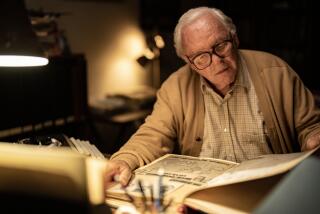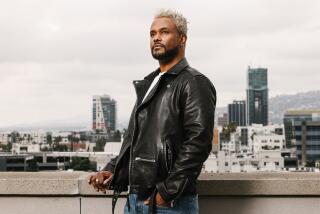With Nelson Mandela movie, the culmination of a winding trek
Among the surprising things about the movie chronicling Nelson Mandela’s journey to freedom is that it began while he was still in prison.
Back in the late 1980s, South African movie producer Anant Singh started corresponding with the imprisoned Mandela. The two had an improbable simpatico. Singh was an Indian outsider raised in South Africa, where he was accorded about the same level of civil rights and protection as blacks under the white-run minority government — that is, almost none.
Mandela, meanwhile, had been on infamous Robben Island for more than two decades, a defanged but hardly deterred hero to nearly every black South African and to human-rights crusaders around the world.
PHOTOS: Fall movie sneaks 2013
“He asked, ‘Do you think people would be interested in a movie about my life?’” Singh recalled in an interview in Toronto last week. “And I said” — he gives a slight laugh — “‘I think they would.’”
It would be a quarter-century before the movie hit the big screen, as it did at the Toronto International Film Festival that ended Sunday. “Mandela: Long Walk to Freedom” is produced by Singh (“Sarafina!” “Get Real”), directed by Justin Chadwick (“The First Grader”) and stars Idris Elba as the complex civil rights leader. It is based on Mandela’s 1994 memoir “Long Walk to Freedom,” which chronicles his life from boyhood through youthful activism in the African National Congress, continuing through his 27-year term under horrifying conditions on Robben Island, his complicated marriage to Winnie Mandela (Naomie Harris) and of course his eventual 1990 release and subsequent political ascendancy in post-apartheid South Africa.
The movie comes out this fall in South Africa and across Europe as well as in the U.S., where it’s set for a Thanksgiving Day release.
PHOTOS: Hollywood backlot moments
Momentum for the film seemed to pick up a few years after Mandela’s early release from a life sentence, particularly in 1994, when Mandela published his bestselling book. (The Nobel Prize-winner initially wanted script approval but Singh convinced him the process wouldn’t work that way.) Singh and Mandela set about agreeing on a contract, signing it in 1996. In that time, of course, Mandela had become an elected leader of South Africa, and other changes, both to the country and to the man, came fast and furious.
“The story had always been a great one, and as time went on it became an even greater story,” Singh said of the time that had passed since the 1980s-era discussions.
As it turned out, the wait was only beginning. Veteran screenwriter William Nicholson was brought in, and the search for a director began. Tom Hooper was to direct it at one point but went to make “Les Misérables” instead. Shekhar Kapur got as far as the negotiation stage. Director schedules, financing challenges and other hurdles cropped up. No movie materialized.
Meanwhile, Nicholson penned draft after draft — more than 40 in all. Viewers at TIFF could be forgiven for thinking what they saw on the screen — beginning in Mandela’s teen years and, at 152 minutes, one of the longest movies set for the fall — was comprehensive. But other drafts went back even further, to the early days of the African National Congress that began in 1912.
INTERACTIVE: From Toronto to the Oscars? Well...
The movie was eventually financed by South African investors and will be distributed stateside by the Weinstein Co. When it premiered in Toronto, it received strong reviews for Elba’s performance, but some criticized it for its traditional structure. (Variety said it “arrives bearing the slightly musty odor of a 1980s Richard Attenborough superproduction: stolidly reverential, shackled to the most dire conventions of the mythmaking biopic.”) Unlike other more modernist biopics, which cherry-pick relevant moments and jump around in time, “Mandela” aims to tell the full arc of a man’s life, and mostly in chronological order. But Singh defends the choice.
“I always felt you had to tell the full biopic,” he said. “In order to understand the journey you had to understand the foundation.
Though respectful in many ways, the movie is willing to look at Mandela’s foibles, particularly a failed first marriage and a fraught relationship with several of his children. “Mandela said ‘I failed my family to serve the revolution,’ and we wanted to show that,” Singh said.
Singh and Chadwick also make the choice to continue the story for another mini-act — an epilogue to some, but critical to them — after Mandela’s 1990 release from prison and the ANC’s rise to power over the years that followed. Fears of black revenge seized many whites at the time, and Mandela made the call, over the objections of members of his own party, to share power with the former white minority government run by F.W. de Klerk until those fears were quelled.
ON LOCATION: Where the cameras roll
“That’s the true sign of leadership,” Singh said. “Because it would have been a lot easier, given everything he had been through, to say no to share power.” (It should be noted that it is not the first movie to deal with the subject of Mandela in recent years, following a Jennifer Hudson film centering on Winnie Mandela and Clint Eastwood’s 2009 rugby drama “Invictus,” in which Morgan Freeman plays the human-rights leader.)
In the U.S., “Mandela” will come out six weeks after the release of Steve McQueen’s “12 Years a Slave,” its depiction of violent 20th century racism in South Africa providing a kind of tragic bookend to the McQueen film about the brutality of slavery in the U.S. South circa the mid-19th century. (“Mandela,” it should be said, does not much carry into the racial and socioeconomic problems that continue through the 21st century into today.)
The film’s premiere will probably be in South Africa, possibly in Johannesburg. Singh hopes Mandela, who after an extended stay in the hospital has been recuperating at home over the last several weeks, will be there. Mandela has not been shown the whole movie, just footage. Singh did cite an incident in which Mandela saw footage of Elba in aging makeup and asked if that was in fact news footage of him.
“I think he was kidding,” Singh said. “But he was making a point.”
Singh said that he made the film out of a sense of storytelling and moral imperative; after all, a new generation is less acquainted with Mandela. But there is, he said, a more universal human message as well.
“What we really want people to take from the movie is that he’s an Everyman. You can be Mandela; I can be Mandela. He always says it: ‘I’m not anything special. I’m not anything that you couldn’t be.’”
ALSO:
Insider: Nelson Mandela has waited a long time to see biopic
NElson Mandela’s 95th birthday: A Time to remember in Soweto
Salinger, Osage County among Weinstein Co. hopefuls
Follow me on Twitter at https://twitter.com/ZeitchikLAT
More to Read
Only good movies
Get the Indie Focus newsletter, Mark Olsen's weekly guide to the world of cinema.
You may occasionally receive promotional content from the Los Angeles Times.







